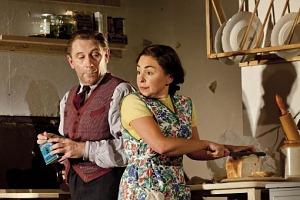Chicken Soup With Barley
First performed in 1958, 'Chicken Soup With Barley' is a complex play about a Jewish family - the Khans - living in London's East End during a period of 20 years from the mid 1930s through to 1956. Essentially, the play is about political idealism set against the background of a working class family struggling to survive.
When we first meet the Kahn family, they are living in an attic. Interestingly, this was a basement in the published text, but was changed to an attic in the original production and that has been retained in this revival. The play opens with preparations being made to thwart a fascist rally which is scheduled to be held in the East End. Sarah Khan and her husband, Harry, are joined by other communists and trade unionists, and Sarah provides food and tea before they set off to outwit the police and disrupt the fascists' rally.
From the start, we see two very different characters in Samantha Spiro's Sarah and husband Harry, excellently played by Danny Webb. The differences are so stark that you wonder how they ever managed to get together in the first place. Sarah is a fiery, energetic and committed fighter, whereas Harry is a work-shy shirker who takes money from his wife's purse, and avoids taking part in the protest by spending the time at his mother's house reading a book. Both Ms Spiro and Mr Webb produce vivid and compelling performances, and are ably supported by the rest of the cast. Dominic Cooke's direction is pretty-well faultless, and Ultz's set is evocatively authentic, reminding me of a relative's council house I used to visit regularly as a child.
The title is explained in the final speeches by Sarah as she tells us that, when her daughter was seriously ill, her husband refused to take her to the hospital and 'disappeared' leaving the pregnant Sarah to look after her daughter alone. Her salvation was in the chicken soup with barley that was provided by a neighbour, Mrs Bernstein. The soup, in a sense, becomes a metaphor for brotherhood and socialism. But by the time the Khan family move to Hackney after the end of World War II, the recipe has already been reduced to just 'barley' heralding the disintegration of the Khan family and the decline of community and idealism.
Though everything about this production spells quality in large capital letters, the play itself is somewhat confusing. Sarah's character is problematic because we see relatively little of her passion as a communist and much more of her as a nagging wife. The overall impression is not that she is an idealistic political activist, but rather someone who believes she has been short-changed in her marriage. At the end, she talks at length about her motives and here we begin to understand more about her, for example when she says she "has to have light and love". That redresses the balance to some extent, but I could not helping feeling sorry for Harry, in spite of his laziness. He cuts a very sad and forlorn figure when he's been incapacitated by strokes.
Sarah's big message at the end of the play is that we have to care. Given the savage cuts working their way through our economy, that message is as relevant today as it ever was. Even with my reservations about Sarah's character, this is nevertheless an important and thought-provoking play which examines the nature of society and the meaning of community and how easily idealism can be blunted by grim, unforgiving reality.
"Flawless production...this is a production that should encourage a whole new generation to discover the often neglected Wesker."
Michael Billington for The Guardian
"Beautifully judged and often deeply moving production."
Charlres Spencer for The Daily Telegraph
"Meticulous and impressive."
Henry Hitchings for The Evening Standard
"Electric and intensely touching revival."
Paul Taylor for The Independent
External links to full reviews from popular press
The Guardian - Daily Telegraph - The Independent
Originally published on
